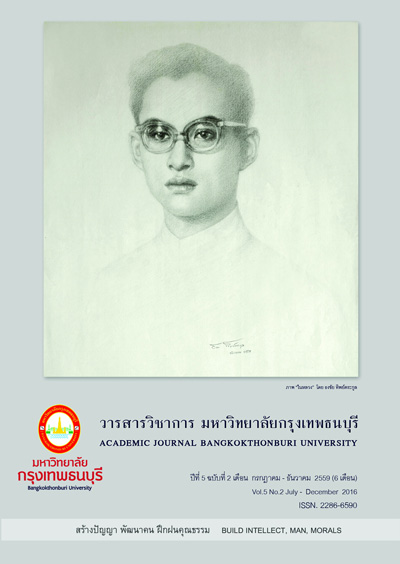แนวทางที่คู่พิพาทยอมรับการไกล่เกลี่ยข้อพิพาทในศาลยุติธรรม Approaches that Lead Disputing Parties to Consensual Acceptance of Mediation in the Court of Justice
Main Article Content
Abstract
บทคัดย่อ
การระงับข้อพิพาทโดยศาลยุติธรรมในปัจจุบันดำเนินการโดย 2 ลักษณะวิธี คือ โดยการสืบพยานหลักฐานและมีคำพิพากษาหรือคำสั่งชี้ขาดตัดสิน กับโดยการไกล่เกลี่ยประนอมข้อพิพาท
วัตถุประสงค์ของการศึกษา ศึกษาสภาพปัญหาที่คู่พิพาทยอมรับการไกล่เกลี่ย หลักแนวคิด หลักทฤษฎีที่อยู่เบื้องหลังการยอมรับการไกล่เกลี่ย เพื่อนำเสนอแนวทางที่เป็นตัวแบบที่ใช้ในการไกล่เกลี่ย และศึกษาปัจจัยส่วนบุคคล ได้แก่ เพศ อายุ วุฒิการศึกษา สถานภาพ และประสบการณ์ในการไกล่เกลี่ยที่แตกต่างกันมีผลต่อผู้เข้าเจรจาไกล่เกลี่ยแตกต่างกัน โดยผู้วิจัยเสนอแนวคิดทฤษฎีที่เกี่ยวข้องกับการไกล่เกลี่ย 4 แนวคิดทฤษฎี คือ แนวคิดหลักการเจรจา แนวคิดทฤษฎีความขัดแย้ง แนวคิดทฤษฎีหลักความยุติธรรม และแนวคิดทฤษฎีหลักธรรมทางศาสนา ตัวแปรต้น ได้แก่ ปัจจัยส่วนบุคคลแนวทางการแก้ปัญหาและแนวคิดทฤษฎี ตัวแปรตาม คือ การยอมรับการไกล่เกลี่ย ระเบียบวิธีวิจัย เป็นการวิจัยเชิงพรรณนาแบบผสม ระหว่างวิจัยเชิงคุณภาพ กับวิจัยเชิงปริมาณ
ผลการวิจัยพบว่า (1) ผู้บริหารศาลพึงพอใจในกระบวนการไกล่เกลี่ยของศาล (2) ผู้ทำหน้าที่ไกล่เกลี่ยควรเป็นผู้มีความรู้ทางด้านกฎหมายและเทคนิคการเจรจาต่อรอง (3) การไกล่เกลี่ยจำเป็นต้องอาศัยแนวคิดทฤษฎีต่างๆ ซึ่งเป็นวิชาการที่ถูกคิดค้นและเป็นที่ยอมรับเป็นพื้นฐานในการเจรจาไกล่เกลี่ย (4) ไม่มีทฤษฎีใดดีที่สุด แต่ใช้หลายทฤษฎีประกอบกัน (5) ไม่เห็นด้วยที่ผู้ประนีประนอมคนหนึ่งทำหน้าที่หลายศาล และไม่เห็นด้วยที่ผู้พิพากษาสมทบไปเป็นผู้ประนีประนอมในศาลอื่น (6) ประสบการณ์ของผู้ทำหน้าที่ไกล่เกลี่ยเป็นสิ่งสำคัญที่สร้างความเชื่อถือแก่คู่พิพาท(7) คู่พิพาทและบุคคลที่เกี่ยวข้องที่เข้าไกล่เกลี่ยทุกคนพอใจกระบวนการไกล่เกลี่ยของศาล (8) บทบาทสำคัญของผู้ทำหน้าที่ไกล่เกลี่ยคือ เสนอแนวทางการแก้ไขปัญหาความขัดแย้งแก่คู่พิพาท (9) เหตุผลการยอมรับการไกล่เกลี่ยเพราะมีการผ่อนปรนลดหนี้ให้แก่กัน และเพราะเชื่อถือในความเป็นกลางของผู้ทำหน้าที่ไกล่เกลี่ย (10) แนวคิดทฤษฎีที่ใช้ในการไกล่เกลี่ย ได้แก่ แนวคิดหลักการเจรจา แนวคิดทฤษฎีความขัดแย้ง แนวคิดทฤษฎีหลักความยุติธรรม และแนวคิดทฤษฎีหลักธรรมทางศาสนา ประกอบกัน (11) ตัวแปรเกี่ยวกับเพศชาย เพศหญิง สามารถเข้าเจรจาไกล่เกลี่ยคดีพิพาทได้ไม่แตกต่างกัน (12) ตัวแปรเกี่ยวกับอายุ วุฒิการศึกษา สถานภาพ และประสบการณ์ในการไกล่เกลี่ยที่แตกต่างกันมีผลต่อผู้เข้าเจรจาไกล่เกลี่ยคดีพิพาทแตกต่างกัน
ABSTRACT
At present there are two methods of dispute settlement in the court of justice, namely, the trial with binding decision or judgment and mediation.
The purpose of this research is to study the problems of mediation, concepts and theories behind the acceptance of mediation in order to propose practical approaches for mediation. In addition, it aims to study mediating personal factors, namely, sex, age, educational qualification, social status and mediating experience which have various effects on mediation. The researcher demonstrates four relevant theories which are the concept of negotiation, conflict theory, justice theory and moral theory. The independent variables are namely mediating personal factors, resolution approaches and theoretical concepts. The dependent variable is the acceptance of mediation. The method of this research is the description mixed research which is the harmonisation between qualitative and quantitative research.
The result of the research reveals that: (1) the executives of the court of justice are satisfied with the mediating procedures; (2) mediator should be a legal expert with negotiating skills; (3) mediation has to be based on a number of theories which are academically and widely accepted as embedded basis for mediation; (4) there is no single best theory for mediation but a combination of several theories; (5) mediator should not perform in many courts; (6) experience of mediator is the key of trust for disputing parties; (7) disputing parties and other relevant parties are satisfied with mediating procedures in the court of justice (8) the pivotal role of mediator is to propose dispute resolution for disputing parties (9) the reasons for disputing parties to accept mediation are debt compromise and credibility in the impartiality of mediator (10) the mediating theories are the combination of the concept of negotiation, conflict theory, justice theory and moral theory. (11) Female and male mediators have indifferent ability in mediation (12) Age, educational qualification, social status and experience in mediation are the variables which have diverse impacts on mediating parties.


